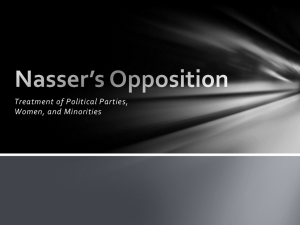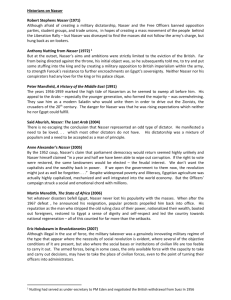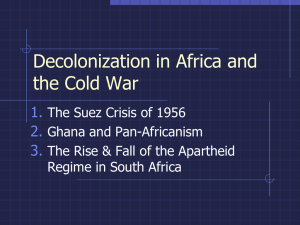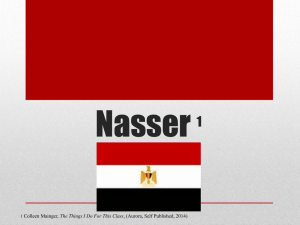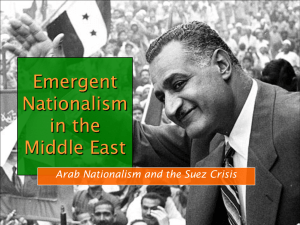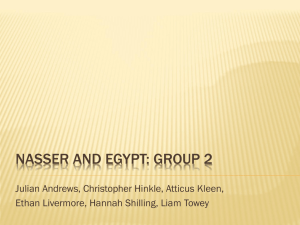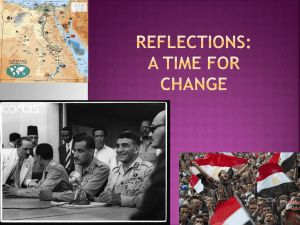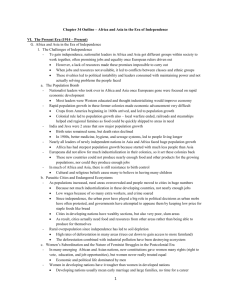Unit Packet Nasser and Egypt Final
advertisement
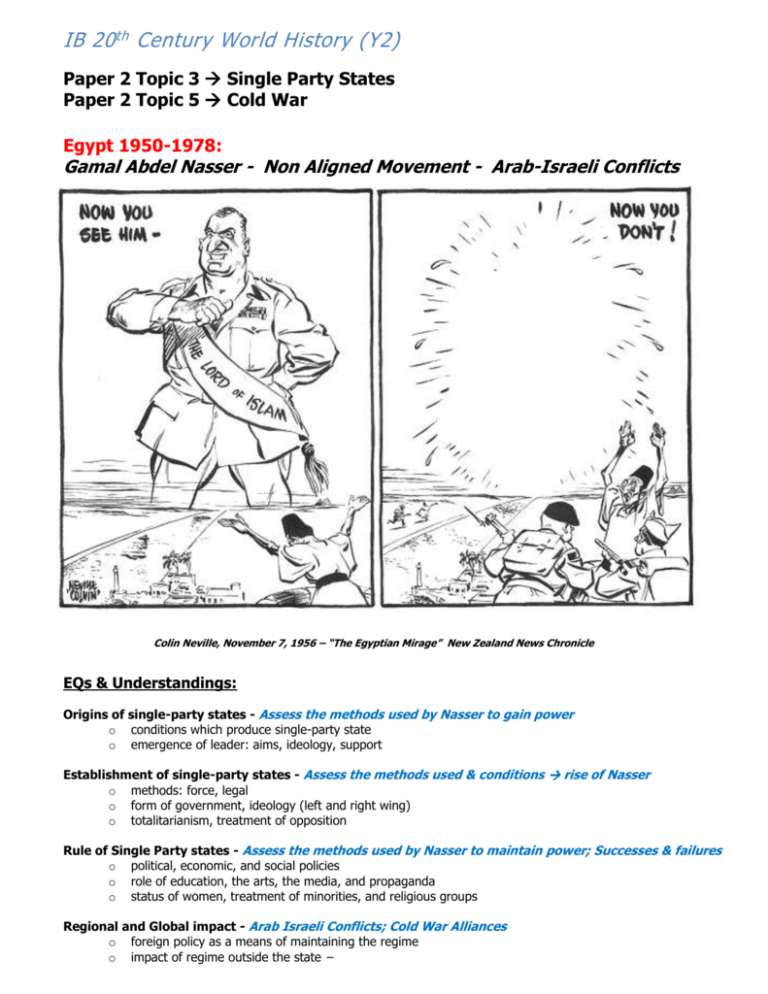
IB 20 th Century World History (Y2) Paper 2 Topic 3 Single Party States Paper 2 Topic 5 Cold War Egypt 1950-1978: Gamal Abdel Nasser - Non Aligned Movement - Arab-Israeli Conflicts Colin Neville, November 7, 1956 – “The Egyptian Mirage” New Zealand News Chronicle EQs & Understandings: Origins of single-party states - Assess the methods used by Nasser to gain power o conditions which produce single-party state o emergence of leader: aims, ideology, support Establishment of single-party states - Assess the methods used & conditions rise of Nasser o methods: force, legal o form of government, ideology (left and right wing) o totalitarianism, treatment of opposition Rule of Single Party states - Assess the methods used by Nasser to maintain power; Successes & failures o political, economic, and social policies o role of education, the arts, the media, and propaganda o status of women, treatment of minorities, and religious groups Regional and Global impact - Arab Israeli Conflicts; Cold War Alliances o foreign policy as a means of maintaining the regime o impact of regime outside the state – o as a factor in the Cold War Unit 3B Outline: IB World History Y2 Paper 2 Topic 3 Single Party States Nasser / Egypt Paper 2 Topic 5 The Cold War Focus of the unit is rise of the military dictatorship in Egypt (19522011?), the establishment of a single-party state under Nasser, as well as Egypt’s role in the Cold War. The latter topic includes examination of Suez Crisis of 1956 and Egypt’s turbulent relationship with Israel. Neither of these topics can be separated from Egypt’s role in the Cold War as a NonAligned nation or from its leadership in the Arab-Israeli conflicts of the 1960s and 1970s. 1. Rise of Nasser and the Free Officers Movement 2. Anti-Imperialism and the Suez Canal Crisis 3. Arab-Israel conflicts (1948, 1956, 1967, 1973) 4. Pan Arabism and the United Arab Republic 5. Arab Socialism 6. Non-Alignment movement KEY FACTS, TERMS & PEOPLE TO KNOW: REGIONAL / INTERNATIONAL Arab Israeli War – 1st (Establishment 1948) Arab Israeli War – 2nd (Suez Crisis 1956) Arab Israeli War – 3rd (6 Days War 1967) Arab Israeli War – 4th (Yom Kippur 1973) Arab League 1945 / 1970 Summit Arab Socialism (ASU) Aswan Dam (1960s) Camp David Accords (1978) Free Officers Movement / coup d’etat Iranian Coup d’etat (CIA - 1953) Israel – Est. of State (1948) Left-Wing ideology Mandate System (1919) Muslim Brotherhood Gamal Abdel Nasser Gaza Strip Nationalization Non-Aligned Movement -Bandung Conference, Indonesia (1955) Palestinian Liberation Organization (PLO-1964) Pan Arabism Sinai Peninsula Suez Canal (British / French) Suez Crisis & Nationalization UAR – United Arab Republic United Nations DOMESTIC Arab Socialist Union (ASU) Aswan Dam Constitution 1956 Constitution 1962 -Judicial mergers -Secular Education policies Fatamid al-Azhar (Sunni scholars) -vs. Wahabi Sauds & Muslim Bro. Land reforms Modernization Muslim Brotherhood Nasserism Sinai Peninsula Tripartite Aggression (Suez War 1956) PEOPLE : HISTORICAL PLAYERS Winston Churchill (UK) John Foster Dulles (USA) Anthony Eden (UK) Dwight D. Eisenhower (USA) STRUCTURE AND CONTENT 1. Rise of Nasser & the Free Officers’ coup d’etat o Mandate System o British Imperialism o Role of the Military o Overthrow of King Farouk 2. Suez Crisis - 1956 o Role of Israel and War o Development of Nationalism o Involvement of UN 3. Governance & Domestic Issues o Suppression of Muslim Brotherhood o Constitutional Republic o Arab Socialism o Secular Reforms o Modernization o “Nasserism” Cult of Personality 4. Middle o o o o o o East – Arab Israeli War(s) Sinai Peninsula / Gaza Strip Baathist Movements UAR or United Arab Republic Arab Socialism 5. Cold War o Non-Aligned Movement o Aswan Dam King Faisal II (Iraq) King Farouk (Egypt) Mohammed Mossedeqh (Iran) Shah Reza Pahlavi (Iran) IB 20th Century World History (Y2) EXAM QUESTIONS & HISTORIOGRAPHY Paper 2 Topic 3 Single Party States Paper 2 Topic 5 Cold War Egypt 1950-1978: The Nasser era is far enough in the past that one can have some historical perspective on it, but it is still close enough that the inquisitive researcher can talk to those who knew Nasser and the inner workings of his regime. . . From an early flirtation with the Muslim Brethren to a later embrace of leftleaning socialism, Nasser remained essentially a nationalist, a pragmatist, and a dictator. But he was a dictator in a military regime in which the military was loyal to his rival, Abdel-Hakim Amer. The Nasser-Amer rivalry, now understood but at the time carefully hidden, helps explain much about Nasser's behavior in the 1960s, including some of his maneuvers on the eve of the fateful 1967 war. Nasser was able to cling to power after the war, but . . . Egyptian politics continue to reflect liberal, leftist, and Islamist currents. Some see this lack of ideological unity in the country as an impediment to development, but it might also be viewed as a promising base from which to construct a more pluralistic and tolerant polity than anything Nasser could imagine.1 TOPICAL QS RISE OF NASSER AND ROLE OF EGYPT IN THE COLD WAR, 1952-1978 How did Nasser consolidate his hold on Egyptian government / 2nd president c. 1956? Assess Nasser’s role in the development of the Suez Crisis? To what extent did Nasser use the Suez Crisis of 1956 to generate national unity? Assess the degree to which Nasser’s government successfully achieved domestic reforms. Analyze the methods by which Nasser eliminated religious and political opposition. Evaluate the degree to which Nasser developed socialism in Egypt. Assess the impacts of Islam / suppression of Islam within Egyptian political system. Evaluate degree to which Nasser’s regime developed mechanisms of the modern Egyptian state? Assess Egypt’s political / financial relationship with the West – including IMF, World Bank and UN Evaluate the impacts of the United Arab Republic and the Palestinian Liberation Organization To what extent to the building and financing of the Aswan Dam impact Cold War relationships? How have historians assessed Nasser’s role in the development of Cold War tensions? Quandt, William. “Review: Egypt During the Nasser Years.” In Foreign Affairs, Vol 73 No 6 (1994). Accessed November 2012 from http://www.foreignaffairs.com/articles/50508/william-b-quandt/egypt-during-the-nasser-years-ideology-politics-civil-society 1 POTENTIAL PAPER 2 QS TOPIC 3 (AUTHORITARIAN & SPS) o Assess methods used by EITHER Peron OR Nasser to maintain his position as ruler of a single-party state (2010) o How successful was Nasser (1952-1970) in solving problems he faced? (2005) o Compare and contrast the domestic policies of two rulers of single party states, each chosen from a different region. (2008) o In what ways, and with what results, was propaganda used by one ruler of a single party state? o In what ways, and with what success, did either Sukarno or Nasser deal with domestic challenges after gaining power? (2011) o In what ways & what success, did one authoritarian ruler deal with internal opposition? (2011) o “The rise to power of authoritarian or single-party leaders depended upon the use of force rather than popular support.” With reference to two leaders, each chosen from a different region, to what extent do you agree with this statement? (2011) o Assess the contribution of economic instability and lack of a united opposition to the rise to power of two leaders of single-party states, each chosen from a different region. (2012) o Compare and contrast the treatment of religious groups and minorities in two authoritarian or single party states, each chosen from a different region. (2011, 2012) o Analyse the methods used by one single-party ruler to establish totalitarian control. (2012) o Assess the extent to which ideological appeal aided the rise and rule of one of the following: Sukarno, Nasser; Perón (2012) TOPIC 5 (COLD WAR) o How and why did the policies of either the USA or the USSR affect superpower rivalry between 1950 and 1970? (May 2003) o “Although it began in Europe the spread of the Cold War to other regions was a much more dangerous development.” To what extent do you agree with this judgment? (May 2003) o With reference to two countries, each chosen from a different region (excluding the US or the USSR), assess the social and economic impact of the Cold War. (2011) o In what ways, and with what success, did the US and the USSR attempt to reduce Cold War tensions between 1956 and 1979? (2011) o For what reasons, and with what results, did the Cold War affect the Middle East between 1956 and 1979? (2011) o For what reasons, and in what ways, did Cold War tensions hinder the work of the United Nations? PEOPLE: HISTORIANS / POLITICAL THINKERS Historiography: Orthodox? Western? Liberal? Revisionist? Post-revisionist? For each Marxist? Geographic / Political context? Date written? (ORIGIN) POV? (PURPOSE and LIMITATIONS) What information? Data? (VALUE) Historians on Nasser Robert Stephens Nasser (1971) Although afraid of creating a military dictatorship, Nasser and the Free Officers banned opposition parties, student groups, and trade unions, in hopes of creating a mass movement of the people behind the Liberation Rally – but Nasser was dismayed to find the masses did not follow the army’s charge, but hung back as on-lookers. Anthony Nutting from Nasser (1972) 2 But at the outset, Nasser’s aims and ambitions were strictly limited to the eviction of the British. Far from being directed against the throne, his initial object was, so he subsequently told me, to try and put some stuffing into the king and by creating a military opposition to British imperialism within the army, to strength Farouk’s resistance to further encroachments on Egypt’s sovereignty. Neither Nasser nor his conspirators had any love for the king or his palace clique. Peter Mansfield, A History of the Middle East (1991) The years 1956-1959 marked the high tide of Nasserism as he seemed to sweep all before him. His appeal to the Arabs – especially the younger generation, who formed the majority – was overwhelming. They saw him as a modern Saladin who would unite them in order to drive out the Zionists, the crusaders of the 20th century. The danger for Nasser was that he was rising expectations which neither he nor Egypt could fulfill. Said Aburish, Nasser: The Last Arab (2004) There is no escaping the conclusion that Nasser represented an odd type of dictator. He manifested a need to be loved. . . which most other dictators do not have. His dictatorship was a mixture of populism and a need to be accepted as a man of principle. Anne Alexander’s Nasser (2005) By the 1952 coup, Nasser’s claim that parliament democracy would return seemed highly unlikely and Nasser himself claimed “in a year and half we have been able to wipe out corruption. If the right to vote were restored, the same landowners would be elected – the feudal interest. We don’t want the capitalists and the wealthy back in power. If we open the government to them now, the revolution might just as well be forgotten . . .” Despite widespread poverty and illiteracy, Egyptian agriculture was actually highly capitalized, mechanized and well integrated into the world economy. But the Officers’ campaign struck a social and emotional chord with millions. Martin Meredith, The State of Africa (2006) Yet whatever disasters befell Egypt, Nasser never lost his popularity with the masses. When after the 1967 defeat , he announced his resignation, popular protests propelled him back into office. His reputation as the man who stripped the old ruling class of their power, nationalized their wealth, booted out foreigners, restored to Egypt a sense of dignity and self-respect and led the country towards national regeneration – all of this counted for far more than the setbacks. Eric Hobsbawm in Revolutionaries (2007) Although illegal in the use of force, the military takeover was a genuinely innovating military regime of the type that appear where the necessity of social revolution is evident, where several of the objective conditions of it are present, but also where the social bases or institutions of civilian life are too feeble to carry it out. The armed forces, being in some cases, the only available force with the capacity to take and carry out decisions, may have to take the place of civilian forces, even to the point of turning their officers into administrators. 2 Nutting had served as under-secretary to PM Eden and negotiated the British withdrawal from Suez In 1956
